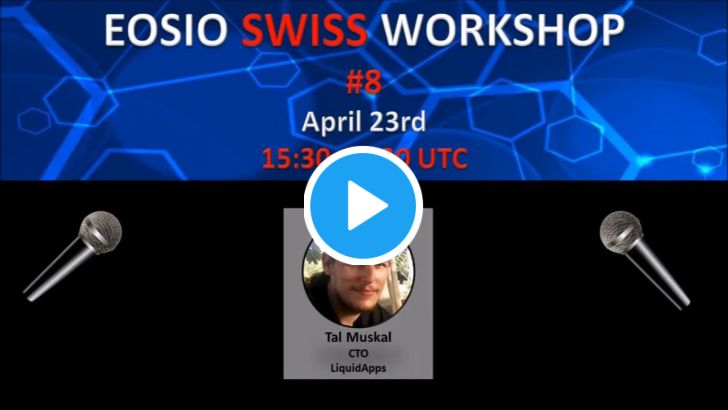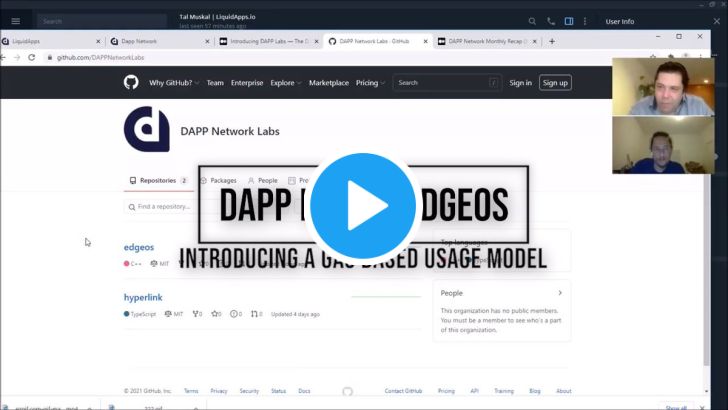Eyal from Bancor joined DAPP Network’s weekly Telegram call. (1) He discussed the potential of launching Single-Sided Liquidity on Bancor. (2) The Edge OS infrastructure continues to grow and could potentially resemble AWS through WASM. (3) DAPP Network proposes switching their staking system to a gas model. This new gas model would create a more efficient way to pay for time using a DSP rather than staking in advance. This concept reduces overlap of staking for services you don’t need. (4) Numerous DAPP Network proposals plan to move forward.
Bancor Single-Sided Liquidity
Single-sided liquidity on Bancor protects new, low-cap projects against impermanent loss. When a small-cap project has a significant increase in token price, liquidity pools experience significant impermanent loss. Eyal indicated, under these circumstances, Bancor would need to issue a lot of BNT to compensate the liquidity providers.
There’s a solution, however, to let new projects create an impermanent loss pool. This pool consists of the project’s tokens and provides insurance for radical price changes. The project would provide X number of tokens to compensate liquidity providers for impermanent loss. Once these funds run-out, the project’s market cap would be much higher. This larger evaluation reduces risk of extreme price changes. Bancor, then, would start issuing BNT tokens to cover impermanent loss moving forward.
There’s an important distinction between single and dual-sided LPs. When depositing two assets, you could experience impermanent loss. But every Bancor LP has BNT tokens on the adjoining side. So it’s okay to provide only one, single-side to these LPs.
Bancor insures against impermanent loss due to massive price changes. You won’t lose tokens if the price goes up. And, if the price goes down, you’ll receive the same amount of tokens as you deposited when providing liquidity.
DAPP token is a prime candidate for Bancor’s single-sided LP. The token has not yet reached a price discovery phase. It’s experienced limited liquidity on EOS, but DAPP ERC-20 tokens are capable of expanding to Bancor. The token uses DAPP Account DAO’s (DAD) bridge to enable these cross-chain capabilities. DAD’s bridge allows DAPP exposure to major liquidity on Bancor.
Every DAPP token on ETH would be backed by at least as many tokens on the EOS side. There will never be more tokens on ETH than EOS.
DAPP’s single-sided liquidity on Bancor will encourage holders to lock their tokens in the LP. DAPP holders are incentivized to earn yield on the tokens they’re holding. And single-sided liquidity ensures their only risk is natural price fluctuations. They’re not at risk for impermanent loss. Once they withdraw DAPP from the LP, they’ll receive the same amount of DAPP or more. And the tokens deposited to DAPP’s LP can still be utilized for governance. If you locked DAPP tokens for 3 months to provide liquidity, you should maintain governance voting power.
Edge OS Updates
Edge computing is not unique to DAPP. It’s the next generation of cloud. DAPP’s Edge DSP is unique because it’s WASM-based and runs in a web browser without requiring a download. This feature opens up many future use cases for turning end users into edge nodes. But these end users won’t even know they’re using a blockchain.
Edge DSP is a framework to run any process typically done with Linux or cloud environments. It’s an isolated container that could essentially run anything in any runtime setting.
Edge OS allows those using services to run contracts on any chain. It’s similar to AWS, but in a much more contained way using WASM processing. You could select a few trusted entities and deploy anything on any decentralized network. This idea could use oracles or create 21 nodes of your own chain without users even knowing.
Edge OS is like a cloud replacement for certain micro-services. Except users only need to know if the products and services meet their needs. Not everyone will care to know the blockchain running these services.
This model allows you to simply pay for what you use. But it’s more dynamic whereas you could use different DSPs each time you operate. The DSP browser shows which nodes are online and offline. Since DSPs are not always online, you could ping all the nodes to see which ones are running.
The Staking Model Switches to Gas
Right now, the staking process works by DAPP holders staking to packages. The DAPP token holder currently needs to know their DSPs in advance. If you wanted to add more DSPs after staking, you’d need to unstake from one and then restake to access others.
The gas model is more dynamic because you’re just paying for time-spent using someone’s infrastructure. DSPs run Edge OS through their browser or terminal. But users would only pay for time rather than advanced staking. So imagine you’re staking for oracles, but you’re actually not using oracle calls. It’s a waste of resources to pay rent without using the full extent of services.
The gas-model unlocks more potential for DAPP’s utility. Currently, if you wanted to run a DSP then you’d need several million DAPP. Since most of DAPP’s liquidity is through defibox, it’s nearly impossible to buy millions of tokens without heavy slippage. For this reason, the community decided to concentrate liquidity on Bancor — pending governance approval.
Whenever a new project launches, there’s initial excitement where holders buy and stake. But, once stakeholders have enough resources, they don’t need to buy anymore.
In a gas-model, someone could start using DAPP services without millions staked. If you want to continue using DAPP services, you’ll have to keep spending gas. So there’s greater incentive to continually purchase DAPP tokens.
It’s easy to buy tokens, or enter and exit a position, on every major Ethereum project. But EOS dex’s don’t have the liquidity to move millions of tokens in-and-out. Once DAPP is easier to accumulate, it’ll also become easier for large DSPs to come aboard. And the gas-model places immediate buying pressure on DAPP tokens.
Numerous DAPP Network Proposals to Move Forward
Governance Bootstrap - Approved
Reduce Max Supply - Approved
21 Guardians - Approved
Bancor LP - Coming Soon
Inflation Rewards - Coming Soon
The new proposals are going to start as open documents. There will be a proposal for Bancor and inflation rewards. A separate proposal is needed to explain how the rewards system works. Eventually, DAPP governance will also require a proposal for any logic included in ETH contracts. Keep an eye out for more updates dropping soon.
This article was prepared and accomplished by Wes Carmichael in his personal capacity. The opinions expressed here are my own and do not reflect the views or opinions of LiquidApps.
Learn how to earn…
Become part of our community.
Follow our socials.
Subscribe to our podcast.
Subscribe to this publication.
It’s free (for now)







